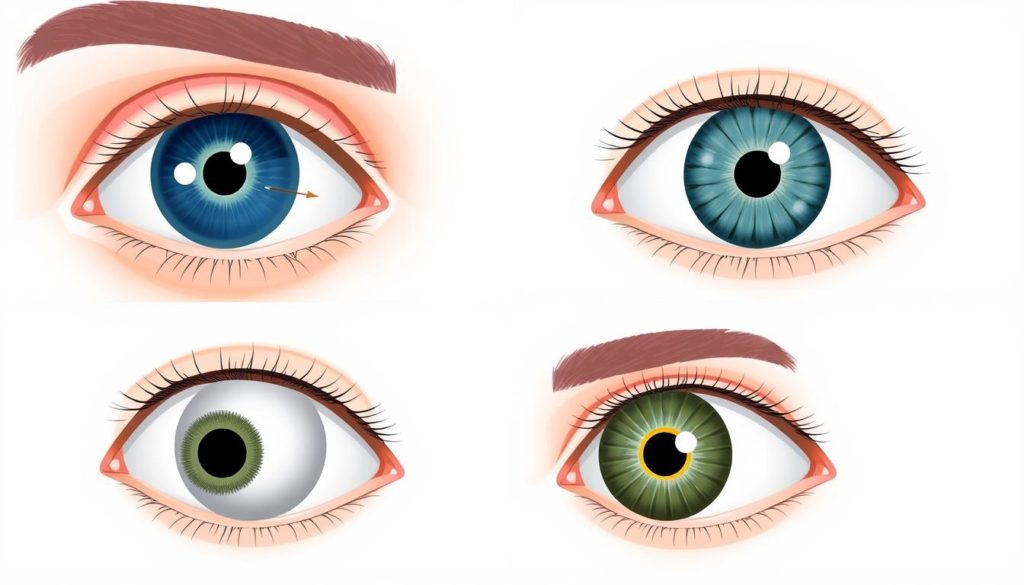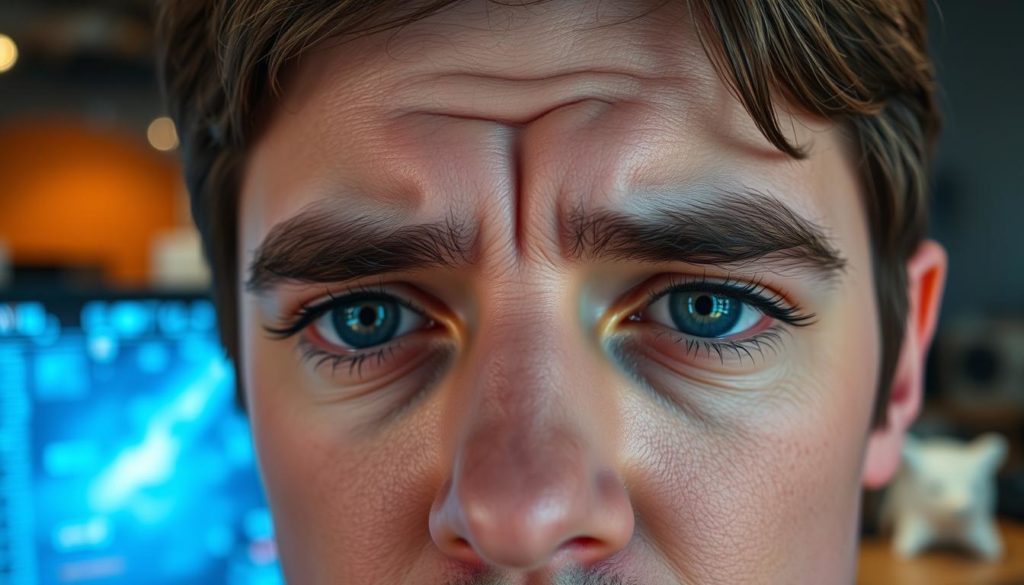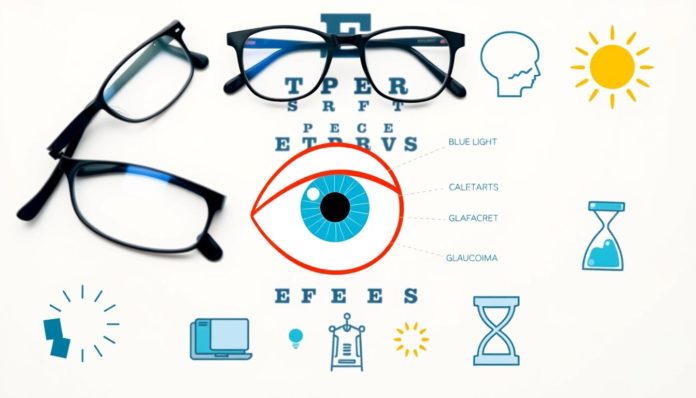Eye problems mean more than just blurry vision. They could hint at larger health concerns. Conditions like diabetes, heart issues, and high cholesterol affect your eyes. These can lead to serious problems such as glaucoma and macular degeneration.
Some autoimmune diseases, like lupus and multiple sclerosis, show signs through the eyes too. This makes eye issues important to catch early.
Infectious diseases can also hurt your eyes. This includes Lyme disease and STIs. A lack of vitamin A might cause night blindness and other vision problems.
Experts suggest getting eye exams starting at age 40. Eye care and prevention are key. They help avoid major vision issues and keep you healthy.
Understanding Common Eye Conditions
Many Americans face common eye conditions. These range from simple refractive errors to complex diseases. We see issues like nearsightedness and farsightedness, along with serious conditions like glaucoma and macular degeneration. Let’s dive into these common eye problems.
Refractive Errors: Nearsightedness, Farsightedness, and Astigmatism
Refractive errors are very common worldwide. They include nearsightedness, farsightedness, and astigmatism. People with these problems may have trouble seeing things far away or close up. They might also have blurry vision because their cornea is shaped oddly. Glasses, contact lenses, or LASIK surgery usually help with these conditions.
Age-Related Macular Degeneration
Age-related macular degeneration (AMD) is a major cause of vision loss in older people. It affects the macula, which helps with clear, central vision. AMD gets worse over time. While it cannot be cured, treatments exist to slow its progression and help keep vision.
Cataracts
Cataracts are another common problem, especially as people age. They make the eye’s lens cloudy, blurring vision. Luckily, a surgery called phacoemulsification can remove the cloudy lens. Then, artificial implants are put in to bring back clear vision.

Glaucoma
Glaucoma is a serious condition caused by too much pressure inside the eye. This can lead to blindness if not caught early. That’s why regular eye exams are important. Treatments like medicated eye drops or laser surgery work to lower eye pressure and protect vision.
| Common Eye Condition | Main Symptoms | Treatments |
|---|---|---|
| Nearsightedness | Blurred distant vision | Glasses, contact lenses, LASIK |
| Farsightedness | Blurred close vision | Glasses, contact lenses, LASIK |
| Astigmatism | General blur | Glasses, contact lenses, LASIK |
| Macular Degeneration | Central vision loss | Treatments to slow progression |
| Cataracts | Clouded vision | Phacoemulsification surgery |
| Glaucoma | Increased eye pressure | Eye drops, laser surgery |
The Role of Digital Eye Strain
In our world today, we often use screens for long periods, leading to digital eye strain. This problem causes discomfort, tired eyes, blurry sight, and constant headaches. Knowing the effects of screen use helps us act to prevent these issues.

To keep our eyes healthy, adopting good habits is key. Here’s how you can fight the negative impacts of screen use:
- Take regular breaks: Follow the 20-20-20 rule. Every 20 minutes, look at something 20 feet away for 20 seconds.
- Adjust lighting: Your screen shouldn’t be too bright or too dark. Change room lighting to lower glare on your screen.
- Blink more often: Blinking more helps avoid dryness and irritation from long screen use.
- Use computer glasses: These glasses help reduce digital eye strain by improving vision for screen distances.
Understanding digital eye strain and how to handle it is crucial for eye health. Here, we compare common symptoms with their solutions:
| Symptom | Remedy |
|---|---|
| Eye fatigue | Take regular breaks, practice the 20-20-20 rule |
| Blurred vision | Adjust screen brightness, ensure proper lighting |
| Headaches | Use computer glasses, correct seating posture |
| Dry eyes | Blink more often, use artificial tears if necessary |
By knowing about digital eye strain and using good habits, you can use screens more safely. Stay ahead by caring for your eyes. This will make your digital times healthier and more enjoyable.
Effects of Lifestyle Choices on Eye Health
Our eyes are greatly influenced by our lifestyle choices. Smoking, eating poorly, and not protecting our eyes from the sun can harm them significantly. It’s key to know how these actions lead to eye diseases and how to prevent them.
Smoking
Smoking is a major negative factor for eye health. It can bring about serious conditions like cataracts and age-related macular degeneration. The toxins in tobacco smoke harm the lens and retina by causing oxidative stress.
Poor Diet
Lacking vital nutrients can cause eye health problems. Not getting enough vitamin A might result in night blindness. Eating a nutrient-rich diet is vital for maintaining good eye health and function.
Sun Exposure Without Protection
Not shielding your eyes from the sun is risky. UV rays can lead to cataracts and heighten the chance of eye cancers. An easy way to keep your eyes safe is by wearing sunglasses that block UV rays.
| Risk Factor | Potential Eye Health Impact | Preventive Measures |
|---|---|---|
| Smoking | Cataracts, Macular Degeneration | Quit Smoking |
| Poor Diet | Night Blindness, General Poor Eye Health | Balanced Diet, High in Vitamins |
| Unprotected Sun Exposure | Cataracts, Eye Cancers | Wear Sunglasses, Use UV-blocking lenses |
Impact of Chronic Diseases on Vision
Chronic diseases can greatly affect our vision. For instance, diabetes can lead to diabetic retinopathy. This happens when high blood sugar harms the retina’s blood vessels. Without proper management, it might cause serious vision problems or blindness.
High blood pressure can also harm your vision. It may bring about hypertensive retinopathy. This condition damages the retina’s blood vessels because of high blood pressure. Consequently, it might result in vision loss.
Autoimmune diseases, like rheumatoid arthritis, can impact the eyes too. They can cause severe eye inflammation. This might lead to conditions such as scleritis, affecting clear vision.
To keep your eyes healthy, understanding and managing these conditions is vital. Regular care for chronic illnesses like diabetes and high blood pressure helps. It lowers the chance of severe eye problems.
The Significance of Preventive Measures for Eye Health
Keeping your eyes healthy is key to your overall health. By taking steps to protect your eyes, you can greatly lower the chance of eye problems. Here are important tips to keep your eyes in good shape.
Regular Eye Exams
Getting your eyes checked regularly is crucial. It helps find early signs of diseases like glaucoma and cataracts. Catching these conditions early can prevent major vision loss.
An annual eye exam can spot problems and get them fixed quickly.
Proper Nutrition
Eating well supports your eye health and can cut down on diseases. Be sure to eat foods rich in vitamins A, C, D, E, zinc, and omega-3s. Good food choices include carrots, salmon, leafy greens, and nuts.
Eye Protection and Safety Tips
It’s important to wear sunglasses and protective eyewear. This keeps your eyes safe from injury and harmful UV rays. Make sure your sunglasses offer 100% UV protection.
Also, use safety goggles for activities like sports or woodworking to prevent injuries.
| Preventive Measure | Description |
|---|---|
| Regular Eye Exams | Detect early signs of eye disease and monitor overall eye health. |
| Proper Nutrition | Include vitamins A, C, D, E, zinc, and omega-3 fatty acids for optimal eye health. |
| Eye Protection | Wear sunglasses with UV protection and use safety goggles during risk-prone activities. |
Adding these eye health steps to your daily life helps keep your vision clear for the future. Following these tips is key to prevent vision problems and ensure a bright vision future.
Factors Leading to Vision Issues in Children
It’s vital to ensure kids grow up with healthy vision. Parents may not realize how crucial early eye examinations are. These exams can catch and treat problems like refractive errors and lazy eye early. Catching these issues early is key for top-notch pediatric eye health.
Sometimes, parents skip preventive care for children. This oversight can lead to ongoing vision problems. These problems can affect a child’s learning and how they interact with friends. It’s wise to include eye exams in your child’s health plan. This way, you can catch and lessen any issues early on.
Let’s look at some common vision problems and how they affect kids:
| Vision Issue | Description | Impact on Development |
|---|---|---|
| Refractive Errors | Problems like nearsightedness and farsightedness | Challenges in reading and focusing |
| Lazy Eye (Amblyopia) | Reduced vision in one eye | Poor depth perception |
| Strabismus | Misalignment of the eyes | Double vision and coordination issues |
| Congenital Cataracts | Clouding of the eye’s lens at birth | Severe visual impairment if untreated |
Early eye check-ups are key in preventing worse conditions later. They support a child’s growth, learning, and how they get along with others. Always make preventive care for children a top priority. This will keep their vision sharp and brighten their future.
Top Causes of Eye Problems in Seniors
As we get older, our eyes can change a lot. This can lead to eye issues for many seniors. Knowing what causes these problems can help in dealing with them better.
Age-Related Eye Conditions
Common eye conditions in older adults include age-related macular degeneration (AMD), cataracts, and temporal arteritis. These can greatly affect vision. They can make daily tasks hard to do.
It’s crucial to watch for any vision changes. Always get advice from an eye doctor when you notice something different.
Medication Effects
Some medicines can affect how well we see. This is especially true for meds taken for long-term illnesses. Seniors must talk often with their doctors about their medicine.
This way, they can handle any eyesight side effects. And they can change meds if needed.
Common Chronic Conditions
Conditions like diabetes and high blood pressure can harm seniors’ eyesight. Not managing them well can lead to big eye problems. Diabetes can even cause blindness.
It’s vital for seniors to have their eyes checked regularly. This helps catch and treat problems early.
The Importance of Early Detection and Treatment
Finding and treating eye diseases early is vital for keeping your eyes healthy. If we catch issues like cataracts or glaucoma early, we can slow or stop vision loss.
To manage eye health well, preventive care is crucial. Getting regular eye exams is important. They can spot problems early on.
Treatments such as injections, laser therapy, and surgeries are very effective. They help correct vision issues and can even restore sight. Let’s explore some common treatments:
| Treatment | Conditions Treated | Effectiveness |
|---|---|---|
| Laser Therapy | Diabetic Retinopathy, Glaucoma | High |
| Injections | Macular Degeneration | Moderate to High |
| Corrective Surgeries | Cataracts, Refractive Errors | Very High |
To manage eye conditions well, we need to do a few things. Early detection, right treatment, and regular check-ups are key. This way, we always know how our eyes are doing.
Adding these steps to your eye care can greatly help. It keeps your vision at its best through your whole life.
Essential Eye Health Tips for All Ages
To keep your eyes healthy at any age, everyone should follow these essential eye health tips:
Start by getting regular eye exams. They help find vision issues early on. You can see why they are important by checking the CDC’s guidelines on preventive eye care.
Eating right is key for eye health. Add foods with nutrients like omega-3s, lutein, and vitamins C and E to your diet. A good diet helps prevent eye problems like macular degeneration and cataracts.
Protect your eyes from the sun’s UV rays. Wear sunglasses that block UV rays when you’re outdoors. And use safety glasses to avoid eye injuries from certain activities.
Keep chronic conditions like diabetes and high blood pressure under control. Managing these health issues helps prevent vision problems.
Finally, think about getting eye surgery if it’s right for you. Talk to your doctor if LASIK could work for your eyes, making sure it fits your needs.
| Eye Health Tip | Explanation |
|---|---|
| Regular Eye Exams | Essential for early detection of vision problems and conditions. |
| Proper Nutrition | Involves a balanced diet rich in omega-3 fatty acids, lutein, and vitamins C and E. |
| UV Protection | Wearing sunglasses and protective eyewear to prevent damage from UV rays and injuries. |
| Manage Chronic Conditions | Control health issues like diabetes and hypertension to support eye health. |
| Consider Refractive Surgeries | Consult about LASIK or other procedures for vision correction. |
Conclusion
Understanding the main causes of eye problems is key to keeping our vision healthy. Knowing about eye conditions and how our digital lives and choices affect our eyes is vital. We can fight off eye problems by being proactive.
Getting regular eye checks, eating right, and protecting our eyes from harm helps a lot. Public health campaigns play a big role too. They teach us how to take care of our eyes, which is important for our overall health. These efforts can help reduce eye problems that we can prevent.
Education and access to good eye care should be part of public health plans. This way, we can catch and treat eye diseases early. This helps everyone, young and old, have better vision. Focusing on eye health improves our lives and helps our communities be healthier.
FAQ
What are the top causes of eye problems in the US?
Many factors can cause eye issues. High blood pressure and cholesterol are big ones. Nutrient shortages and autoimmune diseases count too. So do chronic conditions like diabetes and heart disease. It’s key to get your eyes checked regularly to find these problems early.
What are some common eye conditions Americans face?
People often deal with refractive errors—like being nearsighted, farsighted, or having astigmatism. There are also diseases like age-related macular degeneration, cataracts, and glaucoma. For each, treatments vary. They can include glasses, surgery, meds, and changes in lifestyle.
How can digital eye strain be managed?
To fight digital eye strain, take breaks from screens. Adjust your lighting and sit a good distance from devices. These steps help keep your eyes healthy and ease strain. They can prevent bigger eye issues later on.
How does lifestyle affect eye health?
Bad habits hurt your eyes. Smoking can cause cataracts and macular degeneration. A poor diet can lead to vision issues from a lack of nutrients. Not wearing sunglasses harms too. Quitting smoking, eating well, and protecting your eyes can lower these risks.
How do chronic diseases impact vision?
Diseases like diabetes, high blood pressure, and arthritis badly affect eyes. Diabetes can bring on retinopathy. High blood pressure may result in hypertensive retinopathy. It’s crucial to manage these conditions for your eye health.
Why are regular eye exams important?
Getting your eyes checked often is crucial. It helps find and treat diseases early. This can include glaucoma, macular degeneration, and diabetic retinopathy. Early treatments can lead to better results and protect your vision.
What nutrients are essential for eye health?
Eyes need certain nutrients to stay healthy. Vitamins A, C, D, and E, zinc, and omega-3s are important. These help keep your vision sharp and can prevent diseases like macular degeneration and cataracts. Eating a balanced diet is key to getting these nutrients.
What are the common eye issues seen in children?
Kids often face issues like refractive errors and lazy eye. There’s also strabismus and congenital cataracts. Catching and treating these early is important. It ensures their eyes develop well and prevents future problems.
What are the top causes of eye problems in seniors?
Older adults often face macular degeneration, cataracts, and temporal arteritis. Medicine side effects and diseases like diabetes and high blood pressure also affect their eyes. They need regular eye exams to keep an eye on these issues.
How important is early detection and treatment for eye conditions?
Finding and treating eye conditions early is key. Things like injections, laser therapy, and surgery can work well. They keep conditions like cataracts and refractive errors in check. So, staying on top of eye care is very important.
What are some essential eye health tips for all ages?
Important tips for eye health include regular exams and a nutrient-rich diet. Always wear proper eye protection. Manage any chronic conditions you might have. For some, refractive surgery is a good choice. Following these steps can keep eyes healthy for life.


